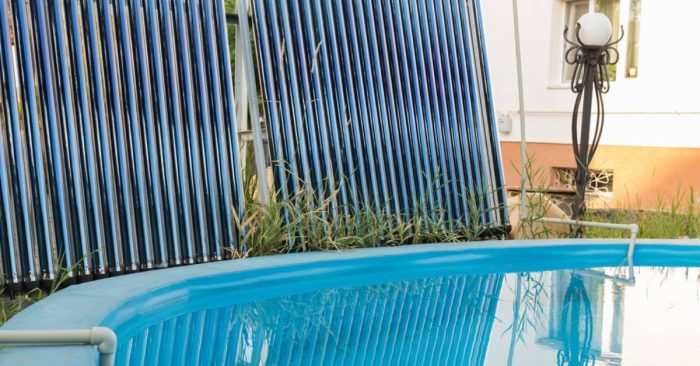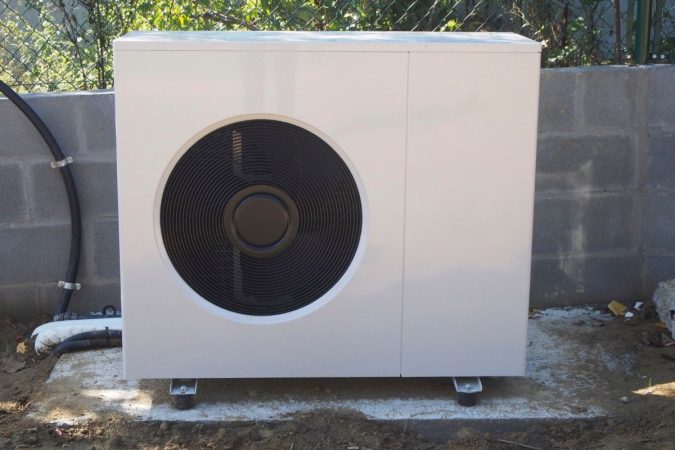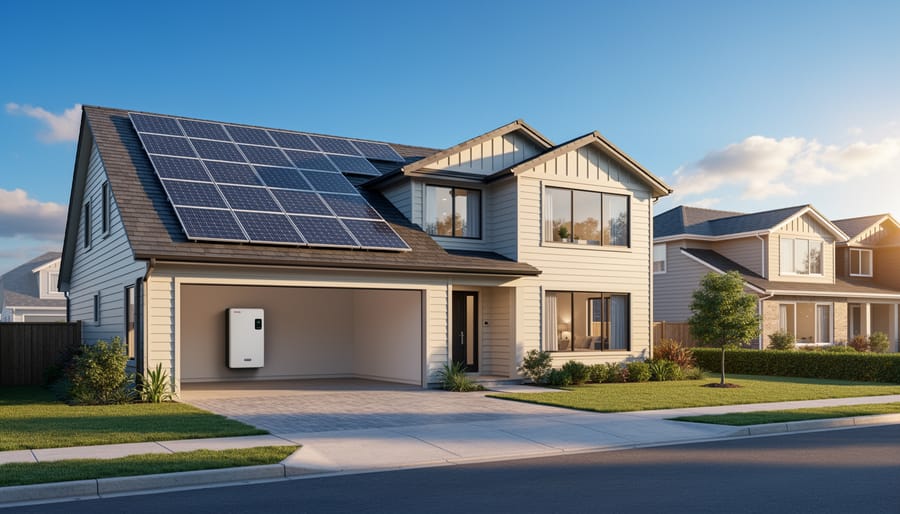Heat Pump vs Solar Pool Heating
Updated:

What advantages do heat pump vs. solar pool heating offer over each other? With solar pool heating, you get cheap operational costs, high durability, low cost of maintenance, and an environment-friendly pool heating option. On the other hand, electric pool heat pumps are cheaper to buy and install. They are also relatively more reliable in areas with low durations of sunlight.
While the electricity consumed by an electric pool heat pump will affect your utility bills, you pay nothing for using the sun for pool heating.
Then again, electric pool heat pumps have more moving parts than solar pool heaters, so they generally require more maintenance. Besides, heat pumps last for 5 to 10 years, on average. But solar pool heaters can last as long as 20 years.
Unsurprisingly, solar heating is not very reliable in areas that do not get enough sunlight. But electric pool heat pumps work fine in such areas – only they consume more power for efficient heating.
If you intend to get an electric pool heat pump, you may spend around $2300-$5500 to buy and install. But you may spend as much as $13,500 getting a solar heating system.
Electric Heat Pump vs. Solar Pool Heating – 6 Main Differences
1. Mode of Operation (How They Work)
Solar Pool Heaters

Solar pool heaters come as solar collectors with inlet and outlet pipes, and their mode of operation is pretty straightforward. Solar collectors are designed like solar panels. But unlike solar panels, they do not generate electricity; they only collect heat from the sun.
Solar collectors work alongside your existing pool pump. The pump drives the circulation of water through the whole system.
As the existing heat pump pushes water from the pool, the pool water passes through the filter and reaches the solar collector through the collector’s inlet pipe.
In the solar collector, the heat collected from the sun is transferred to the circulating pool water. Then the heated water leaves the collector through the outlet pipe and travels back into the pool. The process continues until the pump is turned off or there is no heat from the sun.
A solar heater relies on solar heat to get pool water to certain temperatures. So, in the absence of sunlight or regions with short durations of sunlight, it may not be very effective. Nonetheless, you should be aware that the overall effectiveness of solar heaters depends on their design.
Glazed solar panels/pool heaters and high-temperature collectors store more solar energy than other solar pool heater types. So, when they are used in regions with low durations of sunlight, they offer better performance.
Electric Heat Pump Pool Heaters

Electric heat pumps work by drawing latent heat from the atmosphere. An electric heat pump pool heaters pull warm air from the environment using a fan. The incoming warm air is passed over an evaporator coil to lose heat to a liquid refrigerant.
On absorbing heat from the incoming air, the liquid refrigerant turns to gas. Then, the gaseous form of the liquid refrigerant enters the compressor, where it becomes hotter.
The hot gas leaves the compressor and goes into the condenser, losing heat to the cool pool. As the hot gas loses heat, it becomes liquid again, and as it liquifies, it is transferred back to the evaporator coil to start the healing process.
In all these, electricity is not used to heat the pool directly. Instead, electricity drives the fan that pulls warm air into the pump. This means that pool heating depends on the temperature of ambient air, not electrical power.
Of course, since these heat pumps depend on the latent heat of the surrounding air, they become less efficient in cooler seasons.
2. Running Costs
Solar Pool Heaters
While solar heaters are generally more expensive than other pool heating options, their running costs are the lowest.
The monthly cost incurred when using a solar pool heater is $0. However, you will incur some electricity costs if the existing pool pump runs on electricity. Still, the total cost is typically less than the running costs of electric pool heat pumps.
You can reduce the pool pump’s electricity costs by powering it with solar panels.
Electric Heat Pump
The cost of procuring and installing an electric heat pump is low compared to solar pool heating systems. Conversely, the operating costs of electric pool heat pumps are high.
It is estimated that electric pool heat pumps cost about $100 to run per month. So, you may spend as much as $1200 running an electric heat pump in a year. The costs may be even higher for a regularly used heat pump. One way to cut down on the overall operating cost of an electric pump is to buy a solar pool cover.
3. Heat Source
Solar Pool Heaters
Solar pool heaters rely on the sun’s heat to raise the pool water’s temperature. So, without the sun, they will not heat the pool.
Electric Heat Pump
On the other hand, an electric heat pump relies on the latent heat of the surrounding air. So, generally, when the ambient temperature falls below 45ºF, they will not heat the pool.
In a way, the heat source used in electric heat pumps is also the sun. Look at it this way: the sun heats the ambient air, and the heated air is drawn into the heat pump to warm pool water.
4. Durability
Solar Pool Heaters
Solar heaters are generally low maintenance and relatively more durable than electric pool heaters.
On average, a solar heat pump will last up to 20 years – at least two times the average lifespan of an electric pool heat pump.
Electric Heat Pump
On the other hand, electric heat pumps last for about 5 to 10 years under ideal conditions. This means that if an electric pool heat pump develops no major fault throughout its use, it can last 5 to 10 years. However, if it becomes faulty, its lifespan may be even shorter.
The cost of maintaining electric pool heat pumps is relatively higher than that of maintaining solar heating systems for pools.
5. Operating Costs
Solar Pool Heaters
Installing a solar heating system is pretty expensive. A solar heating system is more expensive than electric resistance pool heaters, electric heat pumps, gas heaters, and other pool heating options.
The cost of solar pool heating systems depends largely on the type of solar pool heater you choose to get.
There are 4 main pool heater types: propylene mats, glazed solar heaters, unglazed solar heaters, and high-temperature collectors.
Solar pool heating systems that use propylene mats are the least expensive. On the other hand, those that use high-temperature collectors are the most expensive.
Propylene mats typically cost around $500 to $3000, unglazed solar heaters typically cost between $1500 and $4000, and glazed solar heaters cost around $3000 to $8500. The most expensive option, high-temperature collectors, costs between $9000 and $11000.
The upside to the steep cost of a solar pool heater is that many dealers usually have financing options. So you may not have to pay for the solar heater at once. Besides, solar pool heating systems are posited to repay the total cost of getting them within 1.5 to 7 years.
Besides the cost of the heater, you may have to pay for installation. The cost of installing a solar pool heater is usually $500. But it can be as high as $2500.
Electric Heat Pump
Compared to options for solar pool heating, the cost of an electric heat pump is relatively lower. You will spend between $2000 and $5000 on average to get an electric pool heat pump.
Installing an electric pool heater (heat pump) costs around $300 to $500.
6. Size Requirements
Solar Pool Heaters
The size of a solar heater is typically around 50% to 100% of the pool’s surface area. Factors like regional temperature, swimming season, use of different types of solar pool covers, and the position of the swimming pool determine the size of the solar heater you get.
One will need larger solar collectors for effective pool heating in areas with lower regional temperatures. At the same time, one will need a solar pool heater with higher square footage in areas with longer swimming seasons.
If your swimming pool already has a solar pool cover, it can do with a smaller pool heater. However, if your swimming pool is above ground, you will need a larger pool heater.
Electric Heat Pump
The size of an electric pool heater pump generally depends on the volume of water in the pool. The larger the volume of water in the pool, the higher the BTU output of the heat pump you need.
Besides the volume of the pool, the season and the position of the swimming pool also affect the required BTU output of a heat pump.
The BTU requirements in summer are generally lower than those in fall and spring. Then, if you want an extended season, the BTU requirements are even higher than those in fall and spring.
As seen with solar heating systems, above-ground pools generally require higher BTU outputs than in-ground pools.
FAQS
What Type of Solar Heater Is Best for a Pool?
The best solar heater for a pool should be able to heat the pool rapidly. It should also retain ample heat, be easy to install, and be durable.
Is a Heat Pump Pool Heater Better than a Solar?
There is no one size fits all answer to this question. The choice between a heat pump vs. solar pool heating, which is better than the other, depends on what matters most to you.
If you want a pool heating option that is inexpensive to run, then solar is the better option. But if you do not want to spend too much on buying and installing your pool heater, an electric pool pump is the better option.
On durability, solar heating is the better option. They last the longest and require fewer maintenance costs. However, electric pool heat pumps promise faster heating than solar collectors.
Solar heating systems are not harsh on the environment. They create heat from solar energy, which is renewable. So, they are eco-friendly. Electric pool heat pumps are eco-friendly but not as much as solar collectors.
A solar system is not the best option for someone who lives in an area with short sunlight. Remember, without the sun. Solar collectors cannot work.
On the other hand, electric pool heat pumps can work in areas with short durations of sunlight. The only thing is they may have to work harder to heat the pool since outdoor temperatures in low sunlight areas are not very high. This, in turn, means that you may incur higher energy bills. Still, it offers more benefits than electric resistance heaters or gas heaters in the same region.
What Is the Most Efficient Way to Heat a Pool?
In the heat pump pool heater and solar pool heating debate, we will answer this in two ways: cost efficiency and energy efficiency.
Regarding cost efficiency, solar heating is the most efficient way to heat a pool. However, when considering energy efficiency, electric heat pumps are more efficient than any other pool heating option.
Is Solar Pool Heater Worth It?
Solar pool heaters are worth it. When used correctly, they can raise the pool water temperature by about 10-15℉ higher than an unheated pool.
Besides that, they are the most cost-effective pool heating option in many climates, incur no direct operational costs, and are eco-friendly.
The main downside to them is that they need the sun to work.
Final Thoughts
Electric heat pumps vs. solar pool heating both have upsides and downsides.
However, if you desire an eco-friendly pool heating system and has low operational costs and high durability, you should consider getting a solar collector.








